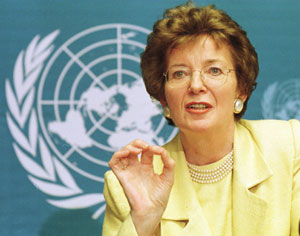Catalans support increased autonomy
Low turn-out in the referendum held in Catalonia, Spain.
Just under 50 percent of voters took part in the referendum to determine Catalan support for the proposed reform which will give Catalonia increased autonomous power. The result, with nearly 74 percent in favour of the new Statute and just over 24 percent against, was a clear victory for the parties backing the "yes" vote. Both the Popular Party and the ERC Catalan Republican Separatist Party had, for different reasons, urged their voters to vote against the new Statute in the campaign leading up to the referendum.
However, despite the clear result, the low turnout out enabled the losing parties to emphasise low participation rather than talk about the result. The last referendum held in Catalonia was in 1979 when Catalans were asked to express their opinion about the statute of autonomy which was passed then and which, on the basis of the result of yesterday's referendum, will be replaced by the new one after the next regional elections. Amost 60 percent of catalan voters participated in the 1979 referendum, although given the fact that it was held just four years after Franco's death and so the right to vote was still very recent for Spaniards, the turn-out then wasn't very impressive either.
The President of the Catalan coalition government Pascual Maragall told reporters that even though he would have preferred a higher level of participation, the "yes" result represented a clear victory for the Government and for Catalonia. And Carod Rovira, the controversial leader of ESC said he accepted the result, but that the whole referendum had been carried out according to the style and arguments of national politics which, in his opinion, was bound to compromise the final result. The ERC leadership had asked voters to vote against the statute because they felt it was insufficient, although many party members probably voted in favour in the end. Mariano Rajoy, leader of the Popular Party who had supported the no vote in order to preserve the unity of Spain, rather predictably used his press conference to urge Rodriguez Zapatero to halt the whole process of increased autonomy. And CIU leader Artur Mas, who many predict will be the next President of Catalonia, celebrated the result and said it was now time to work towards the election of a strong government.
Related:
Congress debates new Catalan Statute
Breakthrough in talks over new statute for Catalonia
Get to know Catalonia:
Guide to Barcelona
Guide to Gerona
Guide to Tarragona
Guide to Lerida
Just under 50 percent of voters took part in the referendum to determine Catalan support for the proposed reform which will give Catalonia increased autonomous power. The result, with nearly 74 percent in favour of the new Statute and just over 24 percent against, was a clear victory for the parties backing the "yes" vote. Both the Popular Party and the ERC Catalan Republican Separatist Party had, for different reasons, urged their voters to vote against the new Statute in the campaign leading up to the referendum.
However, despite the clear result, the low turnout out enabled the losing parties to emphasise low participation rather than talk about the result. The last referendum held in Catalonia was in 1979 when Catalans were asked to express their opinion about the statute of autonomy which was passed then and which, on the basis of the result of yesterday's referendum, will be replaced by the new one after the next regional elections. Amost 60 percent of catalan voters participated in the 1979 referendum, although given the fact that it was held just four years after Franco's death and so the right to vote was still very recent for Spaniards, the turn-out then wasn't very impressive either.
The President of the Catalan coalition government Pascual Maragall told reporters that even though he would have preferred a higher level of participation, the "yes" result represented a clear victory for the Government and for Catalonia. And Carod Rovira, the controversial leader of ESC said he accepted the result, but that the whole referendum had been carried out according to the style and arguments of national politics which, in his opinion, was bound to compromise the final result. The ERC leadership had asked voters to vote against the statute because they felt it was insufficient, although many party members probably voted in favour in the end. Mariano Rajoy, leader of the Popular Party who had supported the no vote in order to preserve the unity of Spain, rather predictably used his press conference to urge Rodriguez Zapatero to halt the whole process of increased autonomy. And CIU leader Artur Mas, who many predict will be the next President of Catalonia, celebrated the result and said it was now time to work towards the election of a strong government.
Related:
Congress debates new Catalan Statute
Breakthrough in talks over new statute for Catalonia
Get to know Catalonia:
Guide to Barcelona
Guide to Gerona
Guide to Tarragona
Guide to Lerida
Labels: regional reform in Spain



